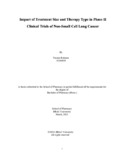Impact of treatment size and therapy type in phase II clinical trials of non-small cell lung cancer
Abstract
In spite of recent developments in cancer therapy that are specifically targeted, a frightening
number of individuals still pass away every year from lung cancer around the world. Because of
this, we decided to focus our research on non-small cell lung cancer. As a consequence of the
high degree of heterogeneity that characterizes lung carcinoma, the unsatisfied clinical need is
the determination of a suitable combination of medications. The requirement for the validation of
efficacy endpoint methods in clinical trials, which are methods by which the effectiveness of
cancer medicines is determined, is one possible cause of the problem that was described above. We intend to help investigators design clinical trials by establishing two predictive efficacy
models, and we plan to optimize the combination treatment for certain lung malignancies by
examining a substantial amount of clinical trial efficacy data. This will allow us to do both.

